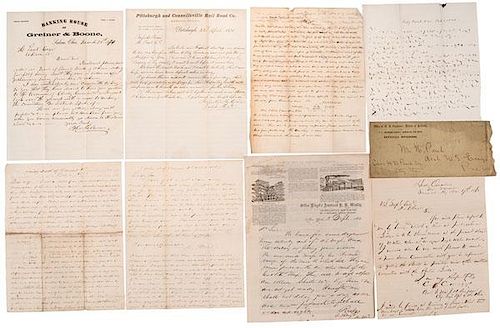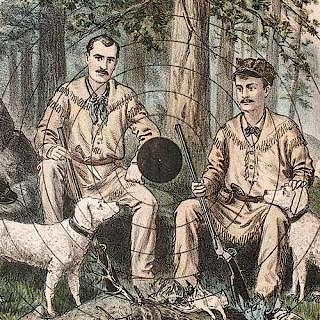Hosea Paul Sr., Surveyor and Early Cuyahoga County, Ohio, Settler, Civil War-Era Archive
About Seller
6270 Este Ave.
Cincinnati , OH 45232
United States
With offices in Cincinnati, Cleveland and Denver, Cowan’s holds over 40 auctions each year, with annual sales exceeding $16M. We reach buyers around the globe, and take pride in our reputation for integrity, customer service and great results. A full-service house, Cowan’s Auctions specializes in Am...Read more
Two ways to bid:
- Leave a max absentee bid and the platform will bid on your behalf up to your maximum bid during the live auction.
- Bid live during the auction and your bids will be submitted real-time to the auctioneer.
Bid Increments
| Price | Bid Increment |
|---|---|
| $0 | $25 |
| $500 | $50 |
| $1,000 | $100 |
| $2,000 | $250 |
| $5,000 | $500 |
| $10,000 | $1,000 |
| $20,000 | $2,500 |
| $50,000 | $5,000 |
| $100,000 | $10,000 |
About Auction
Nov 20, 2015 - Nov 21, 2015
Cowan's Auctions dawnie@cowans.com
- Lot Description
Hosea Paul Sr., Surveyor and Early Cuyahoga County, Ohio, Settler, Civil War-Era Archive
94 Letters, 1840-1928, (bulk 1860-1865).
Born in Vermont, Hosea Paul Sr. (1809-1870) married Ellen Gamble in Canaan, VT in 1833. Hosea Sr. and Ellen settled in Cuyahoga Falls, OH and had seven children: Harrison (1835-1906), George (1837-1900), Mary (1839-1907), Robert (1842-1905), Hosea Jr. (1845-1920), Dwight (1848-1912), and Edward (1851-1906). Hosea Paul Sr. held a number of positions in Cuyahoga Falls, including Mayor. Active in surveying during the Civil War, Hosea Paul Sr. served as the chief of railroad location parties for the US Engineers 5th Division. During much of the war, he was based at Big Hill, KY and in 1864 he worked on surveying fortifications outside of Cincinnati. His son Robert worked for him during this time as well, assisting with his surveying duties. Hosea Paul Sr. died in Cuyahoga Falls in 1870 and Hosea Paul Jr. continued his work as a surveyor and engineer in Cuyahoga County. While the majority of Hosea Paul Sr.'s correspondence is included in this lot, letters between Hosea Sr. and his family and friends can also be found in the proceeding Paul family archives offered as Lots 93-99.
This extensive archive contains correspondence and documentation dating from approx. 1840 until Hosea Sr.'s death in 1870, and includes a few papers from his son, Hosea Paul Jr. dating through 1928. The archive describes his life in Cuyahoga County as a surveyor, engineer, and his involvement in various county and town offices. Many of the early papers describe leases and projects in which he was involved, as well as his work as Mayor and County Surveyor. The papers also contain letters from his brother-in-law, Harrison Gamble, seeking advice on buying land and looking for work. In 1863 Hosea Paul Jr. was appointed Deputy County Surveyor and he worked in that position while he was also serving in the Corps of Engineers. Hosea Paul Sr. was first appointed to the Corps of Engineers in 1860, and served on and off throughout the Civil War. By 1863 Hosea Sr. was regularly writing letters home to his family about his experiences working on the railroad during the war.
This archive as well as others from the Paul family features several examples of Civil War-dated letters between Hosea Sr. and his sons containing encrypted messages, presumably connected to the family's wartime activities. While the letters are signed in the writer's hand, the content is indecipherable.
One letter in particular provides a strong understanding of his experiences during the war. Hosea Sr. enjoyed the work but found it to be lonely. As an engineer he was an important asset and was continually called back into service. He wrote on February 26, 1864, I am sitting alone, in my tent, with the mountains, or rather the leaves are on fire on the mountains—in plain sight fire has been in sign, every night this two weeks and very beautiful they are the mountains nearly all around are some 6 or 700 ft high rising into peaks. Later in the same letter he wrote about the work, The old road crossed the branch red lick 8 times between the end of the Madison Pike + the Post at foot of By Hill, I have cut off the bends so as to save 4 croppings will cut of 2 more next week—in filling a crop the brook these teams destroy our bank almost as fast as we can make it. Some 50 teams have gone down today + there but perseverance will fill them at last, only 5 have broken their wagon tongues in this unfinished half mile today perhaps 10 or 15 would have done so, had we not partially worked it. Yesterday I opened for travel say 100 rods new road on the hill—and commenced covering it with lime rock today. I have 75 negroes 10 white cart drivers 5 overseers there is 1 supt + 1 engineer so we are fully officered for 4 times as many laborers—I am anxious to come home awhile, but cannot yet do so—I am trying to have Major Mix let me send for Robert.
As an experienced engineer, the job of building roads was very important, but it was difficult work that was hindered by the necessary movement of troops and people across Kentucky. Hosea Sr. did not get to visit his wife or have her come to see him as he hoped, but he continued to work for the Corps of Engineers on and off even after the war.
Full transcription of letter referenced above:
Camp Big Hill SE(?) Feb 26. 1864
Dear Son Hosea
Your letter and Mary’s of 21 is rec’d tonight, I also rec’d one, day before yesterday—so you see, they are getting regular, I am sitting alone, in my tent, with the mountains, or rather the leaves are are on fire on the mountains—in plain sight fire has been in sign, every night this two weeks and very beautiful they are the mountains nearly all around are some 6 or 700 ft high rising into peaks, one of them Pilot Knob itself from the level containing say 100 acres of [basic] level on top heavy timber, oak and pine on top—then some 80 or 100 feet rock-cliff perpendicular , then a timbered slope much of it 1 to 1—oak pine cedar tulip—with mulberry and sycamore and black and white walnut on the lowest part, 2 companies of the 47th Infantry are across a small creek about 100 rods from us in plain sight. The fences as far as I can see have been wholly burnt by soldiers I can stay on (?). There is much travel on this road, which hinders our work very much—today one train of 75—6 mule wagons 1 of 50 & 1 of 30 all 6 mile but about 20 which were horses. The old road crossed the branch red lick 8 times between the end of the Madison Pike + the Post at foot of By Hill, I have cut off the bends so as to save 4 croppings will cut of 2 more next week—in filling a crop the brook these teams destroy our bank almost as fast as we can make it. Some 50 teams have gone down today + there but perseverance will fill them at last, only 5 have broken their wagon tongues in this unfinished half mile today perhaps 10 or 15 would have done so, had we not partially worked it. Yesterday I opened for travel say 100 rods new road on the hill—and commenced covering it with lime rock today. I have 75 negroes 10 white cart drivers 5 overseers there is 1 supt + 1 engineer so we are fully officered for 4 times as many laborers—I am anxious to come home awhile, but cannot yet do so—I am trying to have Major Mix let me send for Robert.
Both overseers at this camp, are gone home, and I am supt as well as Engineer, have just written passes for 10 to go home they will mostly return Monday noon some Monday night. Every week or so a regiment passes here, nearly all camps in the woods in sight of our camp. This week 2 regts Indianians have passed the negroes have found 1 revolver and 6 or 8 spurs. I have 5 to bring home if I do not lose them + I have a good saddle horse and have been in the saddle at least 6 hours today--Keeping teamsters from hindering negroes—by talking to them + as well as standing “on the dump” considerable time.
I have got no money but will go to Camp Nelson as soon after 1st March as possible—if I cannot be paid here—the Qr Masters clerk has just returned from there, and knows what will be necessary I suppose but I have not had time to see him yet.
I do wish to see you all very much, in fact I am getting home sick, I wish your mother could come out and live with me a few months, if I should be wanted here so long. She could bring sheets, pillow cases, straw bed tick +c—I think I could hire a room, and my rations would be enough of those articles coffee tea bread meat beans +c for both, and butter and milk in season could be bought, but no vegetables at this time, until new ones—I want to see you all. I suppose Dwight and Ed have both grown much—I wish they would write a few words—I should be very glad to have either of them here, but I have no place to put Eeither, and a quarter masters clerk or errand boy at 30 to 50 dollars a month will not pay expenses pecuniarlly morally or physically.
I keep a revolver near me at all time while about camp, although no one has troubled me at all but there is noisy-stealing. Robbery set around died if they know a man is well arrived they have a wholesome respect for him otherwise they have non, I would like to eat a few more civilized meals, but board at $5 a week is no better than our camp fare fried bacon, half baked soda biscuit (no acid used) coffee sugar molasses—bean soup—hard bread.
Write often, I had a letter from Harry 2 or 3 days ago.
I am affectionately your father
H Paul
Source: A History of Cleveland and Its Environs, The Heart of New Connecticut. Vol II. Biography Elroy McKendree Avery, 1918. - Shipping Info
-
SHIPPING. At the request of the buyer, Cowan's will authorize the shipment of purchased items. Shipments usually occur within two weeks after payment has been received. Shipment is generally made via UPS Ground service. Unless buyer gives special instructions, the shipping method shall be at the sole discretion of Cowan's Auctions, Inc.. Cowan's is in no way responsible for the acts or omissions of independent handlers, packers or shippers of purchased items or for any loss, damage or delay from the packing or shipping of any property.
-
- Buyer's Premium



 EUR
EUR CAD
CAD AUD
AUD GBP
GBP MXN
MXN HKD
HKD CNY
CNY MYR
MYR SEK
SEK SGD
SGD CHF
CHF THB
THB














